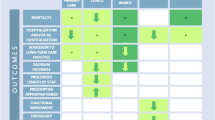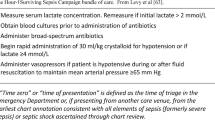Abstract
Objective
We sought to identify and evaluate red flags for pre-surgical geriatric conditions (geriatric syndromes, frailty, and risks for postoperative delirium) in older patients undergoing gastrointestinal surgery.
Methods
Older individuals (≥65 years) undergoing major elective gastrointestinal surgery from 2009 to 2012 were enrolled and assessed preoperatively.
Results
Participants (N = 379; mean age = 74.5 ± 5.9 years) primarily underwent colorectal (54.3 %), gastric (21.9 %), and pancreatobiliary (12.6 %) surgery. Overall, 30.9 % had existing geriatric syndromes, 26.7 % were frail, and 22.8 % had >3 risk factors for postoperative delirium. The largest proportion (45.7 %) presented with at least one geriatric condition. Patients with or without geriatric conditions were discriminated with adequate sensitivity (67 %), specificity (84 %), and positive predictive value (77 %) by eight red flags: age ≥75 years (OR, 2.86; P < 0.001), eating soft food (OR, 3.63; P = 0.001), reported hypertension (OR, 2.8; P = 0.001), weight loss >3 kg (OR, 4.79; P < 0.001), fair-to-weak grip strength (OR, 2.53; P = 0.001), sleeplessness (OR, 2.57; P = 0.001), no-better-than-peer perceived health (OR, 1.88; P = 0.022), and short-term inability to recall two of three common words (OR, 1.81; P = 0.025).
Conclusions
Eight red flags covered as part of history and physical examination are well suited to screen patients for geriatric conditions indicating the need for preoperative geriatric assessments and optimization.
Similar content being viewed by others
References
Audisio RA, Ramesh H, Longo WE et al. Preoperative assessment of surgical risk in oncogeriatric patients. Oncologist. 2005;10:262–8.
Badgwell B, Stanley J, Chang GJ et al. Comprehensive geriatric assessment of risk factors associated with adverse outcomes and resource utilization in cancer patients undergoing abdominal surgery. J Surg Oncol. 2013;108:182–186.
Lawrence VA, Hazuda HP, Cornell JE et al. Functional independence after major abdominal surgery in the elderly. J Am Coll Surg. 2004;199:762–772.
Ganai S, Lee KF, Merrill A et al. Adverse outcomes of geriatric patients undergoing abdominal surgery who are at high risk for delirium. Arch Surg. 2007;142:1072–1078.
Makary MA, Segev DL, Pronovost PJ et al. Frailty as a predictor of surgical outcomes in older patients. J Am Coll Surg. 2010; 210:901–908.
Robinson TN, Wu DS, Stiegmann GV et al. Frailty predicts increased risk for hospital and 6 months healthcare cost following colorectal surgery in older adults. Am J Surg. 2011;202:511–514
Kim KI, Park KH, Koo KH, Han HS, Kim CH. Comprehensive geriatric assessment can predict postoperative morbidity and mortality in elderly patients undergoing elective surgery. Arch Gerontol Geri. 2013;56:507–512.
Popp J, Arlt S. Prevention and treatment options for postoperative delirium in the elderly. Curr Opin Psychiatry. 2012;25:515–521.
Chen CCH, Yen CJ, Dai YT, Wang C, Huang GH. Prevalence of geriatric conditions: a hospital-wide survey of 455 geriatric inpatients in a tertiary medical center. Arch Gerontol Geriatr. 2011;53:46–50.
Inouye SK, Studenski S, Tinetti ME et al. Geriatric syndromes: clinical, research, and policy implications of a core geriatric concept. J Am Geriatr Soc. 2007;55:780–791.
Fried LP, Tangen CM, Walston J et al. Frailty in older adults: evidence for a phenotype. J Gerontol A Biol Sci Med Sci. 2001;56:M146–M156.
Inouye SK, Westendorp RGJ, Saczynski JS. Delirium in elderly people. Lancet. 2014; 383: 911–922.
Revenig LM, Canter DJ, Taylor MD et al. Too frail for surgery? Initial results of a large multidisciplinary prospective study examining preoperative variables predictive of poor surgical outcomes. J Am Coll Surg. 2013;217: 665–670.
Partridge JSL, Harari D, Martin FC, Dhesi JK. The impact of preoperative comprehensive geriatric assessment on postoperative outcomes in older patients undergoing scheduled surgery: a systematic review. Anaesthesia. 2014;69:8–16.
Chow WB, Rosenthal RA, Merkow RP et al. Optimal preoperative assessment of the geriatric surgical patient: a best practices guideline from the American College of Surgeons National Surgical Quality Improvement Program and the American Geriatrics Society. J Am Coll Surg. 2012;215:453–466.
Smets IHGJ, Kempen GIJM, Janssen-Heijnen MLG et al. Four screening instruments for frailty in older patients with and without cancer: a diagnostic study. BMC Geriatr. 2014;14:26–34.
Katz S, Down TD, Cash HR et al. Progress in the development of the index of ADL. Gerontologist. 1970;10:20–30.
Folstein MF, Folstein SE, McHugh PR. "Mini-mental state" A practical method for grading the cognitive state of patients for the clinician. J Psychiatr Res. 1975;12:189–198.
Folstein MF, Folstein SE, McHugh PR et al. Mini-Mental State Examination. User’s Guide. Odessa, Florida: Psychological Assessment Resources, Inc. 2001.
Guigoz Y, Vellas B, Garry PJ. Assessing the nutritional status of the elderly: the mini nutritional assessment as part of the geriatric evaluation. Nutr Rev. 1996;54: S59-S65.
Tsai AC, Ho CS, Chang MC et al. Population-specific anthropometric cut-points improve the functionality of the mini nutritional assessment in elderly Taiwanese. Asia Pac J Clin Nutr. 2007;16:656–662
Yesavage JA, Brink TL, Rose TL et al. Development and validation of a geriatric depression scale: a preliminary report. J Psychiatr Res. 1983;17:37–49.
Liu CJ, Lu CH, Yu S et al. Correlations between scores on Chinese versions of long and short forms of the geriatric depression scale among elderly Chinese. Psychol Rep. 1998;82:211–214
Almeida OP, Almeida SA. Short versions of the geriatric depression scale: a study of their validity for the diagnosis of a major depression episode according to ICD-10 and DSM-IV. Int J Geriatr Psychiatry. 1999;14:858–865.
Chen CCH, Chen CN, Lai IR et al. Effects of a Modified Hospital Elder Life Program on frailty in individuals undergoing major elective abdominal surgery. J Am Geriatr Soc. 2014;62:261–268.
Charlson ME, Pompei P, Ales KL et al. A new method of classifying prognostic comorbidity in longitudinal studies: development and validation. J Chronic Dis. 1987;40:373–383.
Inouye SK, Viscoli CM, Horwitz RI. A predictive model for delirium in hospitalized elderly medical persons based on admission characteristics. Ann Intern Med. 1993; 119:474–481.
World Health Organization. Indicators and strategies for iron deficiency and anemia programs. 1994 Report of the WHO/UNICEF/UNU Consultation. WHO, Geneva.
Zenilman ME. Geriatric risk assessment in surgery: keeping it simple. JAMA Surg. 2013;148:1138–1139.
Chen C-H, Chang H, Huang Y-Z et al. Hand-grip strength is a simple and effective outcome predictor in esophageal cancer following esophagectomy with reconstruction: a prospective study. J Cardiotho Surg. 2011;6:98–103.
Borson S, Scanlan J, Brush M et al. The Mini-Cog: a cognitive ‘vital signs’ measure for dementia screening in multi-lingual elderly. Int J Geriatr Psychiat. 2000;15:1021–1027.
Hosmer DW, Lemeshow S. Applied Logistic Regression. New York: John Wiley & Sons, 1989.
Tabachnink BG, Fidell LS. Using multivariate statistics. New York: HarperCollins, 1996.
Audisio RA, van Leeuwen B. When reporting on older patients with cancer, frailty information is needed. Ann Surg Oncol. 2011;18:4–5.
Tan K-Y, Kawamura YJ, Tokomitsu A et al. Assessment for frailty is useful for predicting morbidity in elderly patients undergoing colorectal cancer resection whose comorbidities are already optimized. Am J Surg. 2012;204:139–143.
van Leeuwen B, Huisman MG, Audisio RA. Surgery in older cancer patients - recent results and new techniques: worth the investment? Interdiscip Top Gerontol. 2013;38:124–131.
Varandhan KK, Neal KR, Dejong CH, Fearon KC, Ljunggvist O, Lobo DN. The enhanced recover after surgery pathway for patients undergoing major elective open colorectal surgery: a meta-analysis of randomized trials. Clin Nutr. 2010;29:434–440.
Inouye SK, Bogardus ST Jr, Baker DI et al. The Hospital Elder Life Program. J Am Geriatr Soc. 2000;48:1697–1706.
Chen CCH, Lin MT, Tien YW et al. Modified Hospital Elder Life Program: effects on abdominal surgery patients. J Am Coll Surg. 2011;213:245–252.
McCorkle R, Strumpf NE, Nuamah IF et al. A specialized home care intervention improves survival among older post-surgical cancer patients. J Am Geriatr Soc. 2000;48:1707–1713.
Shuman AG, Korc-Grodzicki B, Shklar V et al. A new care paradigm in geriatric head and neck surgical oncology. J Surg Oncol. 2013;108:187–191.
Moghdamyeghaneh Z, Phelan MJ, Carmichael JC et al. Preoperative dehydration increase risk of postoperative acute renal failure in colon and rectal surgery. J Gastrointest Surg. 2014;18:2178–2185
Dudrick SJ. Nutrition management of geriatric surgical patients. Surg Clin North Am. 2011;91:877–896.
Singh F, Newton RU, Galvao DA et al. A systematic review of pre-surgical exercise intervention studies with cancer patients. Surg Oncol. 2013;22:92–104.
Chen CCH, Saczynski J, Inouye SK. The modified hospital elder life program: adapting a complex intervention for feasibility and scalability in a surgical setting. J Gerontol Nurs. 2014;40(5):16–22.
Rockwood K, Song X, MacKnight C, et al. A global clinical measure of fitness and frailty in elderly people. CMAJ. 2005;173:489–495
Acknowledgments
This study was supported by a career development grant from the National Health Research Institute (Grant #NHRI-EX-9820PC) in Taiwan.
Conflict of Interest
The authors declare no conflict of interest.
Authors’ Contributions
Study concept and design are by Cheryl Chia-Hui Chen, Min-Tsan Lin, Chung-Jen Yen, and Guan-Hua Huang. Acquisition of subjects and data are by Cheryl Chia-Hui Chen, Min-Tsan Lin, and Jin-Tung Liang. Analysis and interpretation of data are done by Cheryl Chia-Hui Chen, Chun-Min Chen, and Guan-Hua Huang. Drafting or revising manuscript for important intellectual content by Cheryl Chia-Hui Chen, Min-Tsan Lin, Jin-Tung Liang, Chun-Min Chen, and Guan-Hua Huang. Approval of final version to be published was done by Cheryl Chia-Hui Chen, Min-Tsan Lin, Jin-Tung Liang, Chung-Jen Yen, Chun-Min Chen, and Guan-Hua Huang.
Sponsor’s Role
None of the finding agencies had any role in the design, methods, subject recruitment, data collection, analysis, or preparation of the manuscript.
Author information
Authors and Affiliations
Corresponding author
Rights and permissions
About this article
Cite this article
Chen, C.CH., Lin, MT., Liang, JT. et al. Pre-surgical Geriatric Syndromes, Frailty, and Risks for Postoperative Delirium in Older Patients Undergoing Gastrointestinal Surgery: Prevalence and Red Flags. J Gastrointest Surg 19, 927–934 (2015). https://doi.org/10.1007/s11605-015-2760-0
Received:
Accepted:
Published:
Issue Date:
DOI: https://doi.org/10.1007/s11605-015-2760-0




